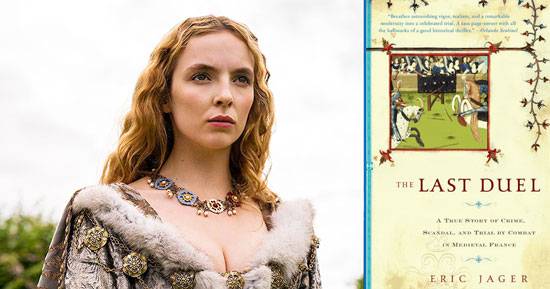Duelling knights, a mullet and MeToo in new Damon, Affleck film

Stay tuned with 24 News HD Android App

Whether a noblewoman lied about being raped is the catalyst for a bloody duel to the death between medieval noblemen in Ridley Scott's new film starring Matt Damon and Ben Affleck.
"The Last Duel," which is loosely based on true events, is both an action film and commentary on sexual politics, as it searches for vestiges of contemporary MeToo sensibility in 14th-century France, where a woman accused her husband's friend and fellow courtier of rape.
The high-profile cast and writing team of Damon, Affleck and Nicole Holofcener did not spare the film some early negative reviews, however.
"An all-star cast and some showstoppingly horrible hair can't save Ridley Scott's medieval epic," wrote The Guardian, with Variety calling the film a "medieval soap opera".
Speaking to reporters ahead of the film's premiere Friday at the Venice Film Festival, Affleck said he found the story of a young wife who speaks out about the rape "important and powerful".
"I do consider myself a feminist and I think this movie principally was really exciting to me because of the character of Marguerite, her extraordinary strength and bravery," Affleck said.
"To have somebody who has been done a great injustice and goes to great lengths to seek justice at great risk to themselves."
Damon, sporting a mullet and looking in need of a good scrub, plays Jean de Carrouges, a knight who defends the word of his wife -- and his own honour -- through a bloody duel. If he has not lied about the allegations levelled against his friend, God will protect him, says the king.
- Rattling armour -
"I will provide for you," De Carrouges utters early in the film as he gallops away on his horse to war, one of the many bits of stock dialogue that hammer home with little nuance the evils of the patriarchy.
The film, wrote The Hollywood Reporter, includes "a lot of pandering to contemporary sensibilities, often skirting close to didacticism as the script hits bullet points about patriarchal privilege and victim-blaming."
Key scenes, most importantly the rape, are shown three times, representing the three diverging perspectives of De Carrouges, his nemesis Jacques LeGris (Adam Driver) and Marguerite (Jodie Comer), and shedding light on the inability of the male characters to see their actions clearly.
Affleck said he wanted to write a movie that pointed to dominant Western culture that "didn't view women for many centuries as human beings".
"And of course many vestigial aspects of that perspective remain."
In what comes off as a wink to the audience at the excesses of his own celebrity past, Affleck plays a womanising, boozing lord who awards gifts of land to the sycophantic LeGris at the expense of De Carrouges.
But the serious themes of sexual assault and female subjugation appear like window dressing given the film's obvious relish for the action sequences, where clashing swords, rattling armour, and hand-to-hand combat reminiscent of Ridley's 2000 blockbuster "Gladiator" are not spared.
"The Last Duel" did not cater to historical accuracy, Damon acknowledged.
"There is a record of what happened, but what it was so uncinematic, that Ridley just was like, 'We're not doing any of that shit.'"
